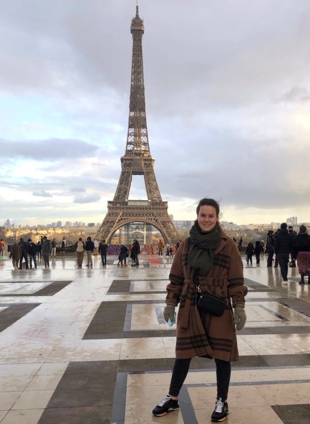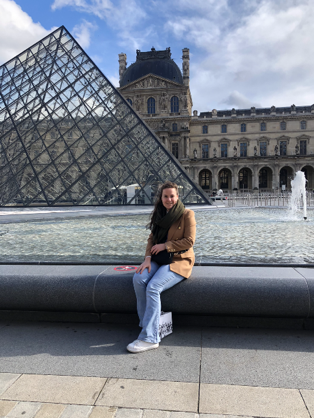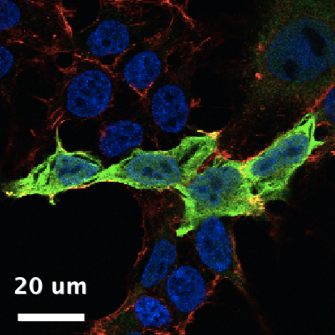I’m An-Marie Schyvens and I recently graduated from UAntwerp with a Master of Biomedical Sciences. In the third year of my Bachelor, I got the opportunity to do a three-week internship at the Antwerp University Hospital (UZA). During this very interesting internship, I volunteered in the Ear-Nose-Throat (ENT) team and my Bachelor thesis research focused on understanding the link between cognition and hearing loss. I joined Prof. Vincent Van Rompaey’s lab, he is a surgeon and his lab works on finding innovative treatments for hearing loss.
I’ve always had a strong interest in the complexity of the human body and the mechanisms that cause disease. At the Antwerp University Hospital I learnt a tremendous amount about hearing loss pathologies and therapeutics, and cognition and Alzheimer’s disease. I enjoyed my internship so much that I then decided to major in Neuroscience for my Master’s.
During my Master’s, I returned to Prof. Vincent Van Rompaey’s lab. I had mentioned to him that I would really like to conduct my Master’s thesis research in a French speaking environment as I really wanted to improve my French. He gave me the wonderful opportunity to do an Erasmus exchange in a lab at the Institut Pasteur in Paris. I arrived in Paris in November 2020, right in the middle of a lockdown!
At Institut Pasteur, I joined the Innovative Technologies and Gene Therapy for Deafness lab, led by Dr. Saaid Safieddine. After receiving a very warm welcome from my colleagues, unfortunately Covid-19 spoiled the party during the first two months of my Erasmus exchange as only 60% of staff were permitted to work in the lab. Although I was really eager to start working in the lab and learn from my colleagues, the obligatory telework did have the advantage that I had ample time to read up about my research topic. My project focused on making a recombinant adeno-associated viral vector (AAV) to specifically target inner ear hair cells. This AAV vector could then be used as a gene therapy tool, where a gene could be inserted directly into a patient’s cells to treat hearing loss. By replacing the defective gene that causes the hearing loss with a healthy gene, the pathophysiology of the hearing loss can be altered and the patient’s hearing could be restored. This new vector would then first be tested extensively in various mouse models to lay the groundwork for future clinical studies in patients with hearing loss.
From January, the real lab work started and I evaluated whether the new viral vectors that we had designed worked in cell and animal models (in vitro and in vivo). Over a period of 5 months, I learned good laboratory practices and spent a lot of time in the cell culture room where I worked with various human cell culture models and learnt new cell culture techniques. I also trained how to carefully inject mice in the round window membrane in the cochlea of the ear. The round window is one of the two openings from the middle ear into the inner ear. Movement of the round window allows movement of the fluid within the cochlea, leading to movement of the cochlear inner hair cells and thus hearing.
I also learned how to do auditory tests on mice and perfected my microdissection techniques. I mastered immunofluorescence staining techniques on the cochleae that we collected. Immunofluorescence staining is a widely used technique in biomedical research and it uses fluorescent-labeled antibodies to detect specific antigens. After these procedures, I used different confocal immunofluorescence microscopes and took many photos of the cells and cochleae.
Unfortunately, museums, shops, cafés, restaurants, … were all closed due to the pandemic and I couldn’t explore Paris as well as I had wanted to. The one thing I was able to do was explore the city on foot. In the first month or two I was only able to go outside for a maximum of 1 hour in a perimeter of 1 km around my residence. Luckily, my residence was close to the river Seine, the Eiffel tower, Jardin des Tuileries, the Louvre museum, and other beautiful places that boosted my numerous walks. Each month, I hoped that the Covid situation would improve, but no such luck. The situation actually got worse and the French government decided to impose a curfew at 6 pm, which made me appreciate the daytime during the weekends even more to enjoy this beautiful city. The last weekend of my stay, I met up with my parents to already start moving some of my items back to Belgium. This was the first weekend that the museums, shops, restaurants and cafés reopened. Although I wasn’t able to visit any museums in a city that is famous for its museums, I’m very grateful that I could still enjoy some nice Parisian cafés after such a long time of being in lockdown.
I left Paris with mixed feelings; I was sad that I needed to leave such a beautiful city and my colleagues at Institut Pasteur, but I was excited to see my friends and family that weren’t able to visit me due to the restrictions. Although an internship abroad in the middle of a pandemic is not easy, I am very grateful that I got this opportunity. Living and studying in a new, unfamiliar city has made me grow as a person and I have met people and gained experiences that will stay with me for a lifetime.
When I returned to Belgium, I completed my Master’s thesis, which I successfully defended. Now that I have graduated, I’m actively thinking about my next career steps. After having such a positive experience in both Prof. Vincent Van Rompaey’s lab (UAntwerp) and Dr. Saaid Safieddine’s lab (Institut Pasteur), I’m really eager and motivated to start a PhD. Until I start my PhD, or another job, I’m welcome at the Institut Pasteur again to continue my research. So who knows, I may be able to explore a Covid-free Paris after all!
Article written by An-Marie Schyvens. Edited by Dr. Bronwen Martin.














